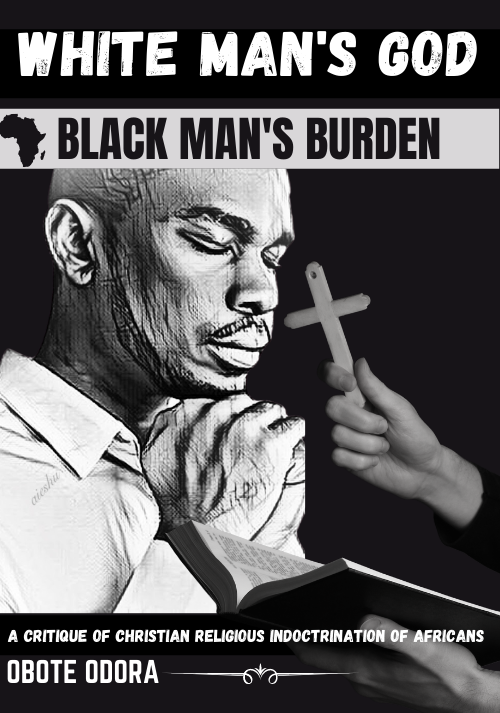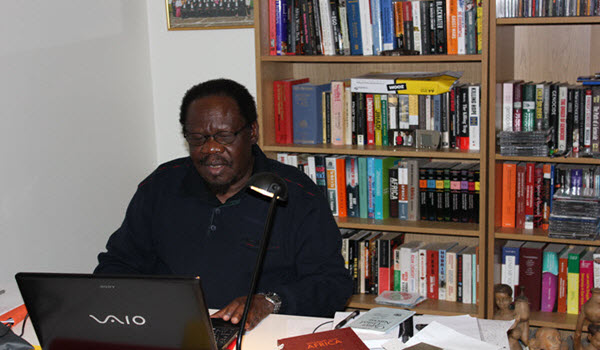
Book Review: White Man’s God Black Man’s Burden and the Bible as a Reconditioned Vehicle
The Book is a Major Contribution to Africa’s Liberation
By Dr Terence Paito
From the onset, Africans in Angola, Congo, South Africa, Uganda, Zimbabwe etc. resisted Christianization. In Uganda for example, Mwanga, the great King of Buganda ordered the execution of an Anglican Bishop enroute to indoctrinate Ugandans. He quickly eliminated the few misguided converts who had succumbed to Europeans religious trickery and accepted to carry a burden. Elsewhere in the diaspora, the Haitians resisted and almost won. Bookman Dutty, the leader of the Haitian revolution urged his supporters to throw away the images of the White God. Which had brought them tears. Once the African resistance was broken, the victorious European missionaries mocked and ridiculed African traditional belief systems. Most tragically, they systematically crippled the African mentally.

Obote Odora’s ‘White Man’s god, Black Man’s Burden’ is a Critique of Christian Religious Indoctrination of Africans. It examines the relationship of Africans and Blacks to the idea of God brought to Africa by White missionaries and subsequently adopted by most Blacks in Africa and in the diaspora. It is argued that Christianization had nothing to do with God but to promote economic interests including slavery of Africans and colonization. The book is divided into eight chapters. Some of the chapters are short, others are rather short. Obote Odora’s work is written in plain English and accessible to a lay reader. In allegorical term, the book conveniently portrays the White Man’s God or Christianity as a ‘reconditioned vehicle, unroadworthy vehicle that had been rejected in Europe but through deception, coercion and fraud, was sold to Africans’. Inevitably, the adoption of the White Man’s god dictates who to marry, how to name your children and the community you associate with. The continued ownership of such an unroadworthy vehicle is a burden which the African must get rid of. Amongst others, two main themes, namely ‘Truth on the one hand and existence of ‘The High God’ on the other, can be discerned in Obote Odora’s work. The author found a lot of inconsistencies in the story of the White Man’s God.
As far as the author is concerned, ‘truth’ is social reality based on facts and logical reasoning. He argues that there are too many inconsistencies in the Holy Bible. Too many ambiguities in the story of creation, and the life of Jesus. The evangelical messages of the missionaries are considered laden with tones of racial superiority or inferiority. The evangelical messages saw nothing wrong with slavery, colonialization and subsequently, justified crime. Therefore, according to Obote Odora there could not be only one version but various truths about religions. Obote Odora castigates especially the so called born again ‘Christians’ for embracing falsehood. To the author, the Gospel, including the death and resurrection of Jesus Christ, was written several decades after the death of Jesus was merely a strategy of the Apostles to convert people into Christianity. Interestingly, Fr. Crazzollara in his work ‘The Lwoo’ also draws our attention to ‘Death descend of Nyikang’. Can Jesus’s resurrection and Nyikang’s descend be reconciled?
The second theme of the book is the existence of a high God. In some cases, the presumption that Africans originally worshipped a high god is refuted by some scholars of African religion. Obote Odora’s acknowledges that communities around the world believe in Gods or different concept of Gods. However, he cast doubt whether the high God was part of African indigenous religion. He is probably a modernist and a post-modernist at the same time. Clearly, Obote Odora is a gallant intellectual warrior who is at the forefront in the battle for African liberation. However, as C.A. Diop and Jacob H. Caruthers have pointed out, intellectual warfare is about ancient Egypt. Diop specifically stated that in the battle for African liberation, ancient Egypt must be the point of reference. White Man’s God Blackman’s Burden For example, grapples with the conflict of ‘creation’ versus ‘evolution’. Interestingly, C.A. Diop in ‘Civilization or Barbarism’, suggested that the ancient Egyptians/Itiyopians had already resolved this problem of the unity of opposites. To Africans there was no conflict between creation or evolution. The question was which one came first. Furthermore, White Man’s God Blackman’s Burden discusses the perception of God in the ancient society. Specifically, it is Aristotle’s opinion that is reflected upon. However, it is also known that Aristotle was a foreign student in Egypt. Why not consult Aristotle’s teachers instead? Afterall, George G.M. James in ‘Stolen Legacy’, argued that Greek Philosophy was the offspring of the Egyptian Mystery system. Moreover, the Comboni Missionaries were mostly anthropologists of the diffusionist school who believed that religion spread from ancient Egypt/Itiyopia to the rest of the world.
The use of the allegory of the ‘reconditioned vehicle’ to describe the White Man’s religion is a deliberate pointer which raises the question, why use a ‘reconditioned model’ if the ‘original model’ can function perfectly? Obote Odora’s work is clarion call for Africans to abandon Christianity as such, it is an important contribution towards the total liberation of Africans.
Dr Terence Paito is a lecturer at INTO University of East Anglia London Campus.





